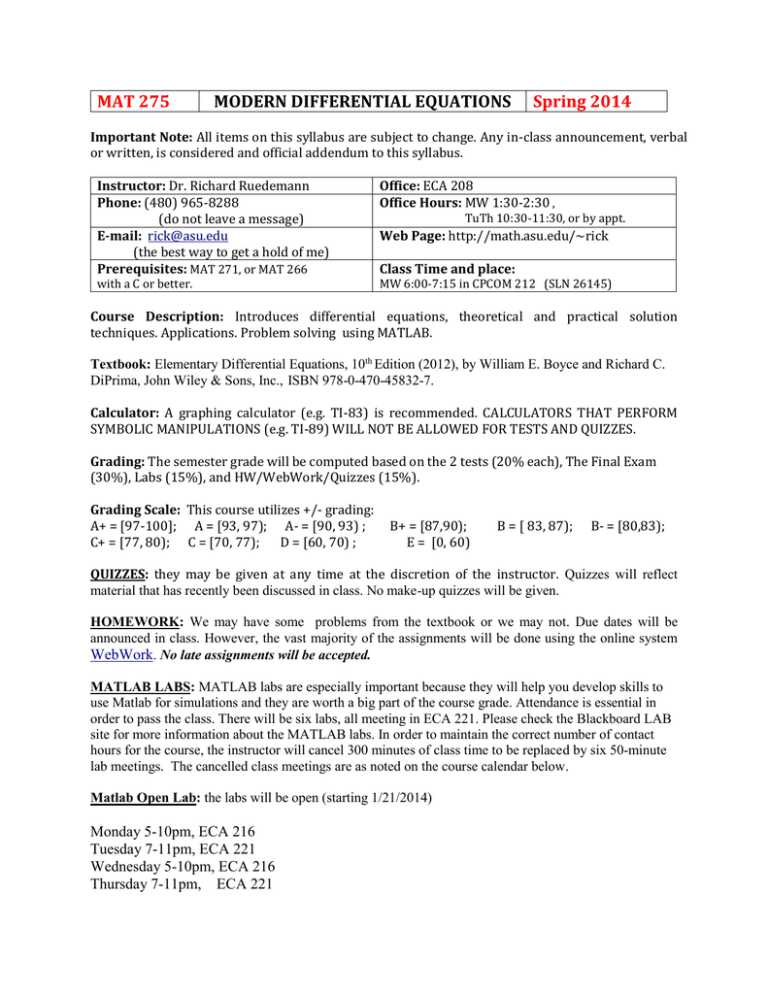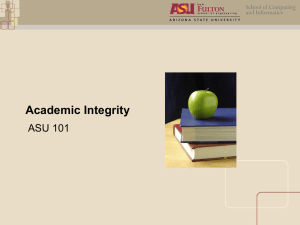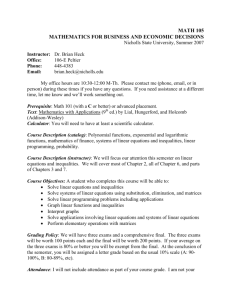MAT 275 MODERN DIFFERENTIAL EQUATIONS Spring 2014
advertisement

MAT 275 MODERN DIFFERENTIAL EQUATIONS Spring 2014 Important Note: All items on this syllabus are subject to change. Any in-class announcement, verbal or written, is considered and official addendum to this syllabus. Instructor: Dr. Richard Ruedemann Phone: (480) 965-8288 (do not leave a message) E-mail: rick@asu.edu (the best way to get a hold of me) Prerequisites: MAT 271, or MAT 266 with a C or better. Office: ECA 208 Office Hours: MW 1:30-2:30 , TuTh 10:30-11:30, or by appt. Web Page: http://math.asu.edu/~rick Class Time and place: MW 6:00-7:15 in CPCOM 212 (SLN 26145) Course Description: Introduces differential equations, theoretical and practical solution techniques. Applications. Problem solving using MATLAB. Textbook: Elementary Differential Equations, 10th Edition (2012), by William E. Boyce and Richard C. DiPrima, John Wiley & Sons, Inc., ISBN 978-0-470-45832-7. Calculator: A graphing calculator (e.g. TI-83) is recommended. CALCULATORS THAT PERFORM SYMBOLIC MANIPULATIONS (e.g. TI-89) WILL NOT BE ALLOWED FOR TESTS AND QUIZZES. Grading: The semester grade will be computed based on the 2 tests (20% each), The Final Exam (30%), Labs (15%), and HW/WebWork/Quizzes (15%). Grading Scale: This course utilizes +/- grading: A+ = [97-100]; A = [93, 97); A- = [90, 93) ; C+ = [77, 80); C = [70, 77); D = [60, 70) ; B+ = [87,90); E = [0, 60) B = [ 83, 87); B- = [80,83); QUIZZES: they may be given at any time at the discretion of the instructor. Quizzes will reflect material that has recently been discussed in class. No make-up quizzes will be given. HOMEWORK: We may have some problems from the textbook or we may not. Due dates will be announced in class. However, the vast majority of the assignments will be done using the online system WebWork. No late assignments will be accepted. MATLAB LABS: MATLAB labs are especially important because they will help you develop skills to use Matlab for simulations and they are worth a big part of the course grade. Attendance is essential in order to pass the class. There will be six labs, all meeting in ECA 221. Please check the Blackboard LAB site for more information about the MATLAB labs. In order to maintain the correct number of contact hours for the course, the instructor will cancel 300 minutes of class time to be replaced by six 50-minute lab meetings. The cancelled class meetings are as noted on the course calendar below. Matlab Open Lab: the labs will be open (starting 1/21/2014) Monday 5-10pm, ECA 216 Tuesday 7-11pm, ECA 221 Wednesday 5-10pm, ECA 216 Thursday 7-11pm, ECA 221 Sunday 2-6pm, ECA 221 Exams: Two midterm tests will be given in class. The best preparation for the exams is regular attendance and completion of all assignments. Your calculator program memory may be randomly viewed during any exam and will be cleared if anything suspicious is written therein. Exam Sections(May change!) Tentative Test Dates (May change!) TEST 1 1.1-1.3, 2.1-2.8, 8.1, 8.2, 2/24/2014 3.1, 3.2 TEST 2 6.1-6.5, 7.1 3/31/2014 Final Exam Comprehensive, includes 3.3-3.8, 7.2-7.8 Monday, May 5th 4:50 - 6:40 PM Final Exam: http://students.asu.edu/final-exam-schedule has the final exam schedule for all classes and will be strictly followed. If a conflict occurs, or a student has more than three exams in one day, the instructor may be consulted about an individual schedule adjustment. If necessary, the matter may be pursed further with the appropriate dean(s). This procedure applies to conflicts among any combination of ASU campuses, and/or off campus classes. Except to resolve those situations described below, no changes will be made in this schedule without prior approval of the Dean of CLAS. The final exam is comprehensive but will consist approximately 50% from material covered after the second midterm test. Check schedule for the date and the room of your final exam. Course withdrawal deadline: April 6th 2014 Complete Withdrawal deadline: May 2nd 2014 Course Policies: Students are responsible for the assigned material whether or not it is covered in class. Students are responsible for the material covered in class whether or not it is in the text. Working regularly on assigned problems and attending class are essential in order to do well. You are expected to read the text before the material is covered in class. Make-up exams are at the discretion of the instructor and only given in the case of verified medical or other emergency. The instructor must be notified before the exam is given, if at all possible. E-mail your instructor and call the Mathematics Department Office (480-965-3951) to leave a message. Picture taking, talking or texting on your cell phone or any electronic device during class is prohibited and will be severely penalized. If you bring cell phones and/or any other electronic equipment to our classroom, make sure it/they is/are turned off before class begins. Any sounds produced by such devices are disruptive to the class and, as such, will not be tolerated and will be reported to the Office of the Dean of Students. Academic Dishonesty: Academic honesty is expected of all students in all examinations, papers, laboratory work, academic transactions and records. The possible sanctions include, but are not limited to, appropriate grade penalties, course failure (indicated on the transcript as a grade of E), course failure due to academic dishonesty (indicated on the transcript as a grade of XE), loss of registration privileges, disqualification and dismissal. For more information, see http://provost.asu.edu/academicintegrity. Disability Accommodations: Qualified students with disabilities who will require disability accommodations in this class are encouraged to make their requests to me at the beginning of the semester either during office hours or by appointment. Note: Prior to receiving disability accommodations, verification of eligibility from the Disability Resource Center (DRC) is required. Disability information is confidential. Establishing Eligibility for Disability Accommodations: Students who feel they will need disability accommodations in this class but have not registered with the Disability Resource Center (DRC) should contact DRC immediately. Their office is located on the first floor of the Matthews Center Building. DRC staff can also be reached at: 480-965-1234 (V), 480-965-9000 (TTY). For additional information, visit: www.asu.edu/studentaffairs/ed/drc. Their hours are 8:00 AM to 5:00 PM, Monday through Friday. Monday Wednesday 1/13/2014 Sections 1,1, 1,2 1/15/2014 Sections 1,2, 1,3 1/20/2014 MLK Day, no classes 1/22/2014 Sections 2.1, 2.2 1/27/2014 Section 2.3, (2.4 ?), 2.5 1/29/2014 Sections 2.5, 2.7 2/3/2014 Section 8.1, 8.2 2/5/2014 Section 8.2, 2.8 2/10/2014 Section 3.1 2/12/2014 Section 3.2 2/17/2014 Section 6.1 2/19/2014 Section 6.2 2/24/2014 2/26/2014 no class TEST 1 3/3/2014 Section 6.3 3/5/2014 Section 6.4 3/10/2014 Spring Break 3/12/2014 Spring Break 3/17/2014 Section 6.5 3/19/2014 Section 7.1 3/24/2014 Section 3.3, 3.4 3/26/2014 no class 3/31/2014 4/2/2014 Sections 3.5, 3.7 TEST 2 4/7/2014 Sections 3.7, 3.8 4/9/2014 no class 4/14/2014 Sections 7.2, 7.3 4/16/2014 Sections 7.5 4/21/2014 Sections 7.6 , 7.7 4/23/2014 no class 4/28/2014 Sections 7.7, 7.8 4/30/2014 Review for final FINAL EXAMS 5/5/2014 - 5/10/2014 Notes LAB 1 this week LAB 2 this week LAB 3 this week LAB 4 this week LAB 5 this week LAB 6 this week Section List: 1.1, Some Basic Mathematical Models; Direction Fields 1.2, Solutions of Some Differential Equations 1.3, Classification of Differential Equations 2.1, Linear Equations; Method of Integrating Factors 2.2, Separable Equations 2.3, Modeling with First Order Equations 2.5, Autonomous Equations and Population Dynamics 2.7, Numerical Approximations: Euler's method 2.8, The Existence and Uniqueness Theorem 8.1, The Euler or Tangent Line Method 8.2, Improvements on the Euler Method 3.1, Homogeneous Equations with Constant Coefficients 3.2, Solutions of Linear Homogeneous Equations; The Wronskian 6.1, Definition of the Laplace Transform 6.2, Solution of Initial Value Problems 6.3, Step Functions 6.4, Differential Equations with Discontinuous Forcing Functions 6.5, Impulse Functions 7.1, Introduction to Systems of First Order Linear Equations 3.3, Complex roots of the Characteristic Equation 3.4, Repeated Roots 3.5, Method of Undetermined Coefficients 3.7, Mechanical and Electrical Vibrations 3.7, Mechanical and Electrical Vibrations(continued) 3.8, Forced Vibrations 7.2, Review of Matrices 7.3, Linear Independence, Eigenvalues, Eigenvectors 7.5, Homogeneous Linear Systems with Constant Coefficients 7.6, Complex Eigenvalues 7.7, Fundamental Matrices 7.8, Repeated Eigenvalues More Departmental and University Policies and Procedures. For semester deadlines related to enrollment, withdrawal or payments, see the academic calendar available at http://students.asu.edu/academic-calendar Course Withdrawal: A student may withdraw from a course with a grade of W during the withdrawal period. The instructor's signature is not required. It is a student’s responsibility to verify that that they have in fact withdrawn from a class. The course withdrawal deadline is April 4th 2014. The grade of Incomplete: A grade of incomplete will be awarded only in the event that a documented emergency or illness prevents the student who is doing acceptable work from completing a small percentage of the course requirements. The guidelines in the current general ASU catalog regarding a grade of incomplete will be strictly followed. Instructor-Initiated Drop: At the instructor's discretion, any student who has not attended class during the first week of classes may be administratively dropped from the course. However, students should be aware that non-attendance will NOT automatically result in their being dropped from the course. Thus, a student should not assume they are no longer registered for a course simply because they did not attend class during the first week. It is the student's responsibility to be aware of their registration status. Honor Policy: The highest standards of academic integrity are expected of all students. The failure of any student to meet these standards may result in suspension or expulsion from the University or other sanctions as specified in the University Student Academic Integrity Policy. Violations of academic integrity include, but are not limited to cheating, fabrication, tampering, plagiarism, or facilitating such activities. The grade of XE: A grade of XE is reserved for "failure for academic dishonesty." Ethics: Grades are based only on academic work and are calculated using the same criteria for all students. It is unethical to bring to your instructor's attention the possible impact of your mathematics grade on your future plans, including graduation, scholarships, jobs, etc. For the university's complete policy regarding ethics and other forms of academic dishonesty, see the Student Academic Integrity Policy at the following web address: http://provost.asu.edu/academicintegrity Student Conduct Statement: Students are required to adhere to the behavior standards of the Arizona Board of Regents Policy Manual Code of Conduct, Academic Affairs Manual ACD 125 Computer, Internet, and Electronic Communications, and the ASU Student Academic Integrity Policy



